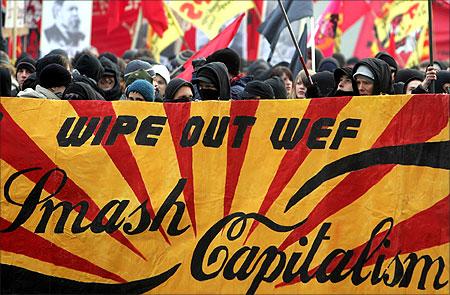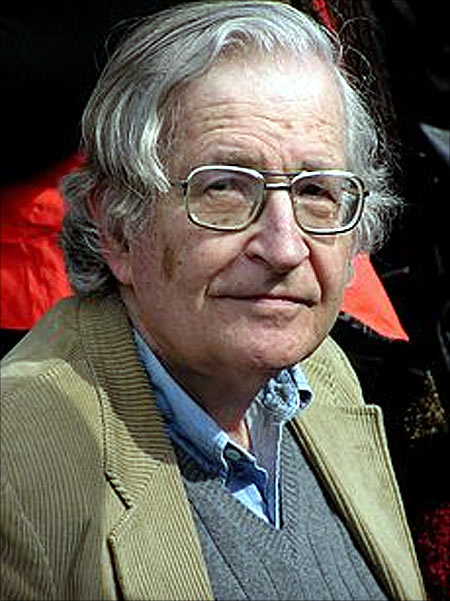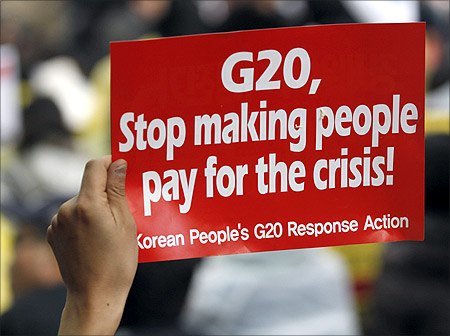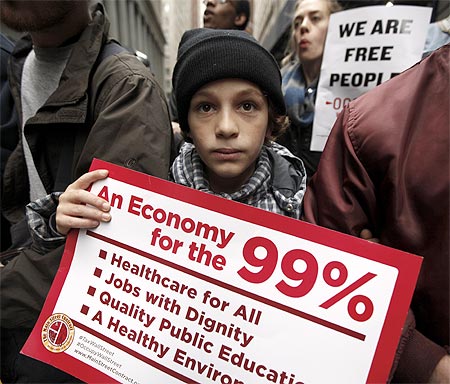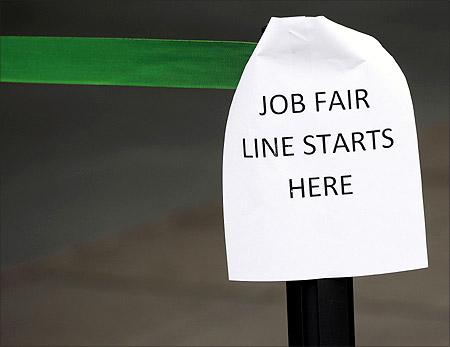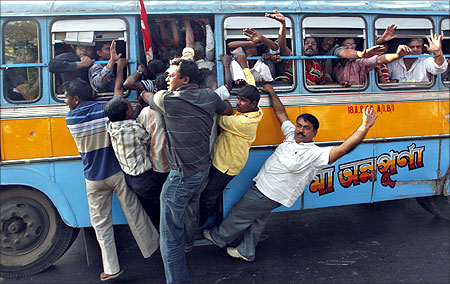 | « Back to article | Print this article |
Globalisation is dead. When will India realise this?
As the West realizes that globalisation has pauperised governments, left its society in disarray and its currency weak, there is a huge re-think there about the very idea of globalisation, writes M R Venkatesh.
Davos is a small town in Switzerland. For nearly two decades or so it has been a Mecca for all those who believe in the idea of globalisation – popularly called globalists.
As a host to the annual World economic forum (WEF), it offers an opportunity to the global political leaders to rub shoulders with global business elite under the watchful eyes of global finance.
In short, if you are not in Davos on an annual pilgrimage, you have not yet arrived at the international scene.
Click NEXT to read more...
Globalisation is dead. When will India realise this?
Noam Chomsky captured the entire paradigm when he states "The WSF is a paradigm example of globalisation. It is a gathering of huge numbers of people from all over the world, from just about every corner of life one can think of, apart from the extremely narrow highly privileged elites who meet at the competing World Economic Forum."
He goes on to explain his opposition to this model of globalisation: "The dominant propaganda systems have appropriated the term 'globalisation' to refer to the specific version of international economic integration that they favor, which privileges the rights of investors and lenders."
Needless to emphasise rights of people and other groups became incidental.
Click NEXT to read more...
Globalisation is dead. When will India realise this?
Lest the reader come to a hasty conclusion that Noam Chomsky was the original and perhaps the only dissenter, let me hasten to add that there have been several thinkers and intellectuals, across countries who have been questioning the root assumptions of globalisation.
Yet thanks to the propaganda machinery that was unleashed, the world was forced to understand economics on a binary footing – between Marx and Markets, with the success of later over former.
Naturally that meant that anti-globalists were labeled Leftists and anti-Leftists were assumed to be votaries of free markets with no other alternative!
By extension that meant collapse of Market economics would inevitably mean return to Marxism!
Click NEXT to read more...
Globalisation is dead. When will India realise this?
As Shariat protect markets
World over, including the US, – yes the US – witnessed wild, spontaneous and bitter protests to this model of globalisation.
The Seattle Ministerial meet of the WTO in 1999 is a case in point which was orchestrated by several NGOs, labour unions, consumers, farmers and religious groups.
Consequently, the next ministerial of WTO was moved to Doha in 2001 where strict Islamic laws prohibited such wild street protests as witnessed in Seattle!
Since then the Doha Round of negotiations to further liberalize global trade has been moving in round and round with so immediate possibility of reaching any conclusion.
Click NEXT to read more...
Globalisation is dead. When will India realise this?
And when multilateral trade was turning to be an impossible idea, self-styled globalists and champions of free markets began peddling the idea of free trade agreements, customs union, common currency and monetary union.
Experiences of the past decade or so demonstrates that all of these ideas have been implemented at great costs to a larger majority – with benefits accruing to a small minority.
The advent of euro is another case in point. Buffoons masquerading as economists had called for a common currency for India and China.
Some went much ahead and made a clarion call for an Asian Monetary Union and a common currency for entire Asia. Some even "foresaw" a Global Monetary Union and a global currency.
Click NEXT to read more...
Globalisation is dead. When will India realise this?
What in interesting to note is that merely a decade later, euro runs the risk of being reduced to a mere footnote in the pages of history.
And the very same people who wanted the euro experiment to be extended globally are now explaining why it could never have succeeded in the first place.
Nevertheless all these debilitating developments have given rise to some newer debate in the world of economics and policy formulations.
The high priests of globalisation are more or less coming to a view, if not a conclusion, that it is indeed not working out as per their prognoses.
And unless a bigger, better and a brighter idea are sold forthwith, global economics runs the risk of being dynamited from within.
Click NEXT to read more...
Globalisation is dead. When will India realise this?
India – an exception
All these developments do not mean the end of Davos or what it stood for.
Rather it implies change of tune even in Davos. Speaking in Davos on Octber 2011, Professor Klaus Schwab, the executive chairman of WEF, states bluntly, "Over the last three years, the world has been engulfed by political, economic and, particularly, financial crisis management."
In a speech aptly titled The Great Transformation – Shaping New Models he says, "We have lost sight of the fundamental transformation that the world is undergoing and of where conventional modes of decision-making have become outdated. What we clearly need are new models for global, regional, national and business decision-making which truly reflect that the context for decision-making has been altered – in unprecedented ways."
Click NEXT to read more...
Globalisation is dead. When will India realise this?
Obviously, globalists will be back using better slogans or as Schwab says newer models. The groups that have combined globally and dominate the global economy surely will not vacate their position so easily. It will continue to hunt in packs.
Interestingly, Schwab in order to address the current impasse suggests the following four new models:
First, a new model is needed to account for the fundamental power shifts (from West to Asia) that have already and are continuing to take place.
Click NEXT to read more...
Globalisation is dead. When will India realise this?
A second new model is needed to acknowledge that we live together in a multicultural, multi-ethnic and multi-religious world. (the idea of domination is over)
A third new model is needed to seriously address the social impact of globalisation and the new wave of technological innovation
We need a fourth new model for job creation
But there is something more profound in all this. As a solution Schwab talks of a system that provides an opportunity to people with the capability to create their own jobs and simultaneously move from the pure concept of unemployment to the concept of micro-entrepreneurship.
Click NEXT to read more...
Globalisation is dead. When will India realise this?
Of course, he concedes that this will require fundamental changes in educational systems, nurturing a societal spirit of entrepreneurial risk-taking, allowing true gender equality – to integrate the other half of hidden talents – and making innovation a key imperative.
In conclusion he says that, "The success of any national and business model for competitiveness in the future will be less based on capital and much more based on talent. I define this transition as moving from capitalism to talentism."
Click NEXT to read more...
Globalisation is dead. When will India realise this?
As the West realizes that globalisation has pauperized governments, left its society in disarray and its currency weak, there is a huge re-think there about the very idea of globalisation.
Schwab talks explicitly of nation – an idea that till the other day was submerged in the "larger" idea of globalisation. By doing so, Schwab has inadvertently signaled the death of globalisation.
More to the point, talentism referred by Schwab is a virtue of India. No wonder Indian economy dominated the global economy till the nineteenth century.
Click NEXT to read more...
Globalisation is dead. When will India realise this?
The last two-hundred years have at best been an aberration at best and the world economy is once again returning to its natural state.
World over, governments across continents are preparing for this tectonic shift and deal with the emerging global order. The idea of the west is to ensure that the present order continues as long as possible while simultaneously adjust and prepare for the same.
Roughly extended, Schwab's idea suggests that the days of large multi-national corporates and global finance are over. It is very clear that globalisation is the cause of the extant financial crisis in the "West" which is neatly marketed as a "global" economic crisis.
Click NEXT to read more...
Globalisation is dead. When will India realise this?
In effect, West is global and global is West – a primary reason why globalisation failed. Crucially, from now on, if Schwab is to be believed, small business and nationalist ideas will prevail.
However, there is a notable exception to all these developments. When others realize the death of globalisation, we in India continue to swear by globalisation! Strangely, we in India are committing Sati for the failure of globalisation.
Why? Often it is seen that it is the awe of the alien that is at the root of our problems. For the first forty years of independence we were in awe of communism - an alien idea.
Click NEXT to read more...
Globalisation is dead. When will India realise this?
The next twenty were dominated by globalisation - another alien idea. In the process little do we realize that the world has been dominating us by exporting their idea and conducting an experiment on us.
The world is on the threshold of reaching a tipping point shortly where it jettisons "global" ideas (for the uninitiated Communism too was a form of globalisation).
Naturally it is in search of a newer model. While one does not entirely agree with Schwab, one warmly welcomes fresh thinking on the subject.
Click NEXT to read more...
Globalisation is dead. When will India realise this?
Given these developments, it is incomprehensible that we continue to be in completely oblivious to these developments.
How can a country that is perceived by the world to lead in the coming future still be caught in the past dogmas, spurious ideas and outdated ideologies, given up even by their very authors?
Leadership in 2012 will be all about seizing this chance and preparing for change.
The time for India to lead the world is arriving. The moot point is – Is India, Indians and Indian leadership prepared?
The author is a Chennai-Based Chartered Accountant. He can be contacted at mrv@mrv.net.in
